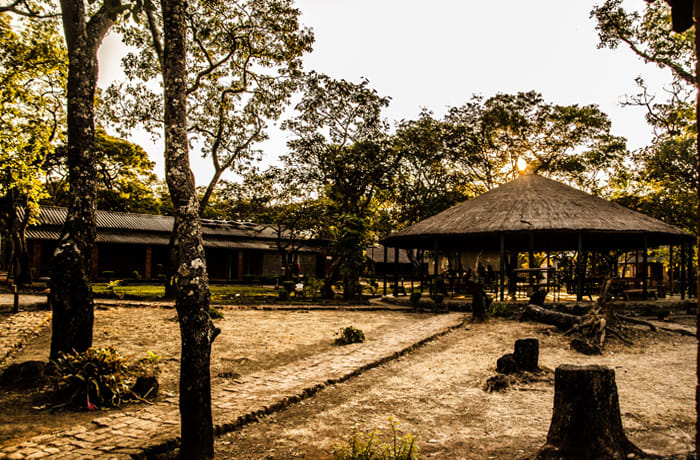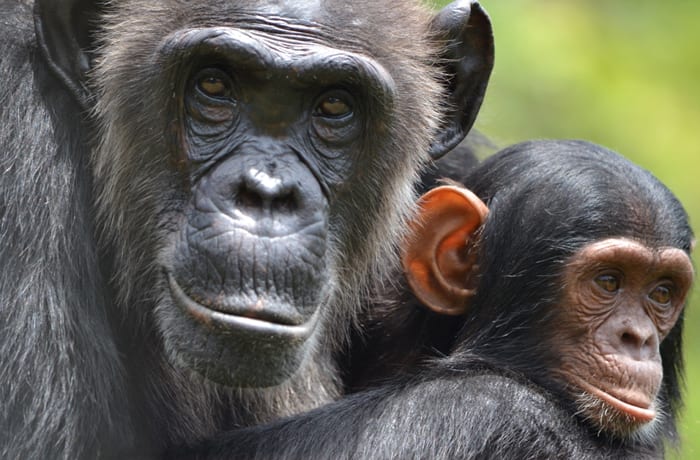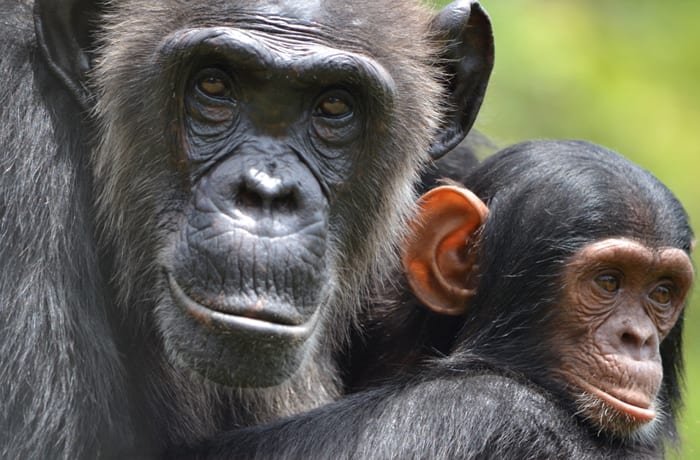
Chimfunshi Wildlife Orphanage and Trust
Contact info
| Sun | 08:00-16:00 |
| Mon | 08:00-16:00 |
| Tue | 08:00-16:00 |
| Wed | 08:00-16:00 |
| Thu | 08:00-16:00 |
| Fri | 08:00-16:00 |
| Sat | 08:00-16:00 |
Tourist attraction
Situated in the north of Zambia, Chimfunshi started as a family-run wildlife orphanage. Today it is managed by a Board of Trustees to ensure the long-term sustainability of the Sanctuary. Chimfunshi was founded in 1983 when a game ranger brought a badly wounded infant chimpanzee to the cattle ranch of David and Sheila Siddle. The Siddles nursed Pal the chimp back to health, thereby establishing a tradition of care and respect that forms the legacy of the sanctuary. Once word of Pal's recovery spread, the Siddles were inundated with orphaned chimpanzees. 'All I know is that I held a dying chimpanzee in my arms that day and it changed my life forever,' Sheila Siddle. Although many of the chimpanzees were confiscated from poachers who attempted to smuggle the infants into Zambia for sale as pets, an equally large number were rescued from dilapidated zoos and circuses from all over Africa, Asia, Europe and South America. With 120 chimpanzees, Chimfunshi is now one of the largest chimpanzee sanctuaries in the world. In 2002, an education centre was built to provide a facility to teach the youth of Zambia about ecology and wildlife conservation. Local and international students researching group behaviour and ethnic studies also use it. Opening Times 08:00 to 16:00. Best viewing times for the chimpanzees: 10:00 – 11:30 and 13:30 – 15:00. Gates close at 17:00. Location Chimfunshi Wildlife Orphanage and Trust is located 65km from Chingola, along the Solwezi Road. As you drive past the mine traffic lights on the outskirts of Chingola towards Chililabombwe, you will come to a police checkpoint. At this point, turn left onto the Solwezi Road and drive for about 50 km. You will then find a big Chimfunshi sign board. Turn right onto the untarred road and the sanctuary is 15km from the main road. Entry fees Entry charges are ZMW50 for adults and ZMW25 for children aged 13 and below. Entry is free for children below the age of three. Are you a part of a school group, church group or sporting club? The sanctuary offers groups of over 20 a discount. Please contact the office or email enquiries@chimfunshiwildlife.org. Discounts are not available on weekends or public holidays. Please note that the sanctuary does not have credit card facilities and all payments are cash only. Chimfunshi Wildlife Orphanage and Trust thanks you for your support. Your entry fees go directly to the running of the sanctuary and to the care of the chimpanzees. Reception and gift shop Visit our gift shop for a selection of curios and souvenirs to take home with you. Cold drinks and snacks are also for sale. Accommodation Want to escape the hustle and bustle of the city? Why not enjoy the peacefulness of the bush. Chimfunshi offers three rustic cottages, each with two twin bed rooms and a large dormitory in each cottage. The basic rooms are clean and comfortable. Camping and campervans are welcome. However note that these are unpowered sites. The ablutions are environmentally friendly, long drop toilets with a western seat, with communal hot showers available from late afternoon. If you are self catering, there are braai stands on which to cook your meals. Alternatively you can use the communal kitchen, which is equipped with a gas stove/oven, plates, glassware, cutlery, saucepans and fry pans. As courtesy to other visitors, all dishes used should be washed and left clean for others to use. A communal fridge is available to keep your groceries refrigerated. Charges for Accommodation Self catering – Adults K250 per person per night, children K125 per child per night. Camping (includes full use of kitchen, fridge and braii facilities) – Adults K200 per person per night, children K100 per child per night Camping (fully self catering) – Adults K150 per person per night, children K75 per child per night. (Accommodation fees do not include the entry fee to view the chimpanzees.) Self-catering Day visitors are welcome to bring their own food for a picnic or braai under the thatched lapa. Alternatively surround yourself in the lush miombo forest at the chimpanzee enclosures and eat lunch at the picnic tables. The cost for the use of the braai stands and charcoal is K50. If you bring your own wood or charcoal, the braai charge is K20. Chimfunshi catering With prior arrangement before your visit (at least 3 days prior notice is needed), Chimfunshi can offer catering services. For day visitors – a variety of freshly made sandwiches from K30 or braai (BBQ) packs are available from K35/person to K70/person. For overnight visitors – three tasty meals will be prepared for you during your stay. For K250 per person you will get to enjoy:
- Breakfast consisting of cereal or oats, eggs (cooked to your preference, served with bread, tea or coffee.
- A packed lunch to go – whether it is taken with you to view the chimpanzees or back on the road again. Packed lunch includes a freshly made sandwich, fruit and bottled water
- After a busy day at the chimps or the long drive, for dinner choose from one of the following heartwarming, homemade hot meals: Chicken, beef or vegetable stir fry served with rice; roast chicken with roast potatoes and vegetables; or braai – beef, chicken and sausage served with potato salad
Bring your own drinks or purchase cold drinks from the gift shop. Electricity Chimfunshi is powered entirely on solar energy. When there are many visitors, power is likely to run out by 1800 hrs. The sanctuary recommends you bring a head torch, a hand-held torch or candles, as evenings can be very dark out in the bush. Transport To visit Chimfunshi, visitors are required to have their own transport to travel around the sanctuary. The education centre is where you'll find the reception, gift shop and accommodation is located. The chimpanzee enclosures are located 4.5kms away. If you wish to visit the orphanage, with a chance to personally meet Chimfunshi's founder, Sheila Siddle, the orphanage is located 8kms away. From Ndola and Chingola, Chimfunshi can recommend trusted and reliable taxi drivers to take you to the sanctuary. Contact details can be provided at time of booking if required. Prices should be negotiated between the taxi driver and youselves at the time. Communications While visiting Chimfunshi, due to its location, please note that there is limited mobile reception. There are 'hot spots' where you may be able to connect to MTN and Zamtel, however Airtel is limited to the main road. Chimfunshi has access to satellite Wi-Fi, available to overnight visitors for a fee of K50. About chimpanzees The chimpanzee is the animal kingdom's closest relative to humans. In fact, chimpanzees are more similar to man than they are to other apes. Research indicates that chimpanzees are over 98% genetically identical to humans. Baby chimpanzees, for instance, mature at roughly the same rate as humans, often staying close to their mothers until the age of eight. Chimpanzees are native to Equatorial Africa, and once roamed in vast numbers across 25 countries in West, Central and East Africa. But relentless poaching, logging, habitat destruction, and human encroachment, have reduced the wild population to less than an estimated 150 000, and they are classified as an endangered species. Chimpanzees are social animals with strong family bonds. They live in large groups of 25 or more. Female chimpanzees are attentive mothers, often doting on their offspring for the first four or five years. Chimpanzees are also efficient hunters and toolmakers, and exhibit many of the same emotions once thought exclusive to humans, such as jealousy, envy, compassion, greed, sloth, avarice, and malice. Hunted for meat or captured for sale to foreign zoos and animal testing labs, chimpanzees are disappearing at a rate of 6,000 per year. The illegal hunting and subsequent sale of primate meat, known as 'bush meat', is a thriving commercial enterprise and is on the increase with the depletion of forests. Many of the chimpanzees at Chimfunshi have been rescued from poachers or terrible situations, where they have been kept as a pet in a bar, dungeon or sold in local markets for bush meat or as pets. Unfortunately chimps living in the wild in Africa are at extremely high risk of being poached for bush meat. Chimpanzee babies who survive the hunting ordeal are often sold as pets, zoo animals, or circus performers, while some end up being used for medical research. Chimfunshi is a safe haven for all its residents and is home to the healthiest captive chimps in the world. There are four large forested enclosures, so the chimpanzees are in a very natural habitat – as close to their natural environment as possible. Other wildlife at Chimfunshi Apart from chimpanzees, there are other rescued animals such as baboons, vervet monkey's, parrots, antelopes, owls, buzzards, sheep, peacocks and many more. Important bird area Did you know Chimfunshi is recognized as an 'Important Bird Area' (IBA #22). Close to the orphanage is one of the most interesting and attractive bird watching areas worldwide? An Important Bird Area (IBA) is an area recognised as being a globally important habitat for the conservation of bird populations. Some of the species that can be found at Chimfunshi include:
- Pale billed hornbill
- Coppery tailed coucal
- Miombo Scrub Robin
- Red capped Crombec
- White headed Black Chat
- Chestnut backed Sparrow-Weaver
- Broad tailed Paradise-Whydah
If you are interested in bird spotting, be sure to bring your binoculars, stay overnight and set off early for a sunrise over the flood plain or view along the Kafue river. Enjoy the beauty and see what birds you can see. Our supporters Chimfunshi Wildlife Orphanage and Trust operates entirely on donations and sponsorship. Without the financial support provided by their valued donors and visitors, the sanctuary and its inhabitants could not survive. Supporters
- Chimfunshi Germany
- African Impact
- Gonzaga University (USA)
- Shoprite Chingola
- Shoprite Chililabombwe
- Atheneon
- Lufarge
- Suntec
If you wish to begin supporting programs offered, there is a variety of ways to do so. Chimfunshi offers a variety of sponsorship programs to suit your interests, all of which will bring great benefits to the environment, wildlife and the communities within which the trust work. You can:
- Sponsor a chimpanzee As a sponsor, you will receive a sponsorship certificate, a photo of your chimpanzee and the Chimfunshi newsletter.
Support the community school and help provide a better education to the next generation.
- Help build a healthcare clinic and improve access to basic health care to this isolated community.
Chimfunshi Wildlife Orphanage and Trust needs to build new enclosures to be able to continue rescuing chimpanzees from inhumane circumstances and illegal activities such as the bush meat and smuggling trades, which sadly still exist today. Volunteer at Chimfunshi Through their partnership with African Impact, volunteers work alongside staff to help take care of the chimpanzees on this award-winning project. Volunteers have the unique experience of interacting with orphaned chimps; and play a vital role in behavioural enrichment activities, infrastructure development and community farming initiatives. A portion of the funds raised through the African Impact volunteer program goes to the cost of operating Chimfunshi Wildlife Orphanage and Trust and caring for its 120 chimps. For more information, please visitwww.africanimpact.comResearch at Chimfunshi In recent years, Chimfunshi has evolved into a major centre for education and research. The sanctuary offers the unique opportunity to observe the complex social behaviour of chimpanzees in their almost natural habitat and in large social groups. It also allows a number of social and educational projects in the field and a chance to get to know the people and culture of Zambia. Animal welfare and research thus compliment each other perfectly: primate researchers from around the world come to Chimfunshi to investigate the chimpanzees' social behaviour, communication and cognition. Researchers conduct observational studies, while learning about the daily lives of people in an African country. The education center at Chimfunshi not only attracts international primate researchers but also students from America and Europe as well as school classes and their teachers from Zambia. Chimfunshi works closely and regularly with scientists from the Max Planck Institutes for Evolutionary Anthropology (Leipzig, Germany), and for Psycholinguistics (Nijmegen, Netherlands), the Free University of Berlin, and Gonzaga University in the U.S.




Contact information
| Sun | 08:00-16:00 |
| Mon | 08:00-16:00 |
| Tue | 08:00-16:00 |
| Wed | 08:00-16:00 |
| Thu | 08:00-16:00 |
| Fri | 08:00-16:00 |
| Sat | 08:00-16:00 |

